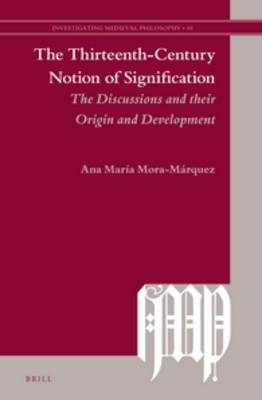
The Thirteenth-Century Notion of Signification
Brill (Verlag)
9789004298675 (ISBN)
In The Thirteenth-Century Notion of Signification, Ana María Mora-Márquez presents an exhaustive study of the three 13th-century discussions explicitly dealing with the notion of Significatio. Her study aims to show that the three discussions emerge because of apparently opposite claims about the signification of words in the authoritative literature of the period, namely in Aristotle, Boethius and Priscian. It also shows that the three discussions develop in the same direction – towards a unified use of the notion of signification, which keeps its explanatory role in semiotics, but loses its role in grammar and logic. Mora-Márquez offers us the first exhaustive analysis of the scholarly discussions around the notion of signification in the pre-nominalist medieval tradition.
Ana María Mora-Márquez, Ph.D. (2009), University Paris 1, is a researcher of medieval philosophy at the University of Gothenburg. She has published articles on medieval logic and semantics, including ‘Boethius of Dacia and Radulphus Brito on the Universal Sign “Every”’.
Contents
Introduction 1
Part 1
Signification of Concepts and Signification of Things
1 Ancient Sources 11
1.1 Aristotle’s Perihermeneias 11
Perihermeneias 1.16a3–8: Utterances as Symbols and Signs 13
Perihermeneias 1.16a9–18: Simple and Compound
Linguistic Items 18
Contradiction and Equivocation 20
1.2 Boethius’ Second Commentary on the Perihermeneias 21
The Subject Matter of the Perihermeneias according
to Boethius 22
Boethius on Perihermeneias 1.16a3–8 23
Concepts and Likenesses in Boethius 31
2 Medieval Discussions about Signification of Concepts and Signification
of Things 36
2.1 Whether Words (Qua Names) Signify Concepts or Things 36
The Semiotic Angle 41
The Immediate Signification of Concepts 41
The Modist Rejection of the Immediate Signification of
Concepts 52
Roger Bacon and Peter John Olivi’s Rejection of the Immediate
Signification of Concepts 61
The Verificational Angle 70
2.2 Whether Words Lose Their Signification with the Destruction of
Their Significate 76
Anonymus Alani’s ‘Omnis Homo De Necessitate Est Animal’
(Paris bnf Lat. 16135, ff. 99rb–103vb) 80
Roger Bacon’s De Signis iv.2 87
Boethius of Dacia’s Sophisma ohnea 92
Peter John Olivi’s Quaestiones logicales q.3 95
Anonymus Alani’s Solution to the Sophisma ohnea 98
Part 2
Signification in Logic and in Grammar
3 Names and Verbs in Priscian and in Aristotle 109
3.1 Priscian on the Constitution of Parts of Speech and Sentences 109
The Role of the Notion of Signification in the Division and Order of
the Parts of Speech 111
Names and Verbs and Their Construction according to Priscian 115
3.2 Names and Verbs in Aristotle’s Perihermeneias 118
4 The Role of the Significate (significatum) in Grammar and in
Logic 123
4.1 The Pre-Modist Tradition 123
4.2 The Modist Tradition 139
Conclusion 157
Bibliography 163
Index of Subjects 176
Index of Modern Authors 180
Index of Ancient and Medieval Authors 182
| Erscheint lt. Verlag | 27.8.2015 |
|---|---|
| Reihe/Serie | Investigating Medieval Philosophy ; 10 |
| Verlagsort | Leiden |
| Sprache | englisch |
| Maße | 155 x 235 mm |
| Gewicht | 430 g |
| Themenwelt | Geschichte ► Allgemeine Geschichte ► Mittelalter |
| Geisteswissenschaften ► Philosophie ► Geschichte der Philosophie | |
| Geisteswissenschaften ► Philosophie ► Logik | |
| Geisteswissenschaften ► Sprach- / Literaturwissenschaft ► Sprachwissenschaft | |
| ISBN-13 | 9789004298675 / 9789004298675 |
| Zustand | Neuware |
| Informationen gemäß Produktsicherheitsverordnung (GPSR) | |
| Haben Sie eine Frage zum Produkt? |
aus dem Bereich


